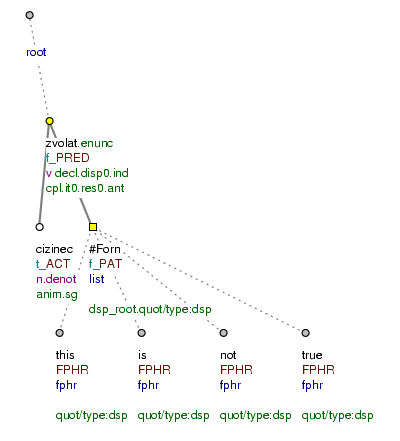- Definition of the functor
FPHR -
The functor
FPHR(foreign phrase) is a functor assigned to the node representing a foreign-language expression, which is a part of a structurally non-analyzed text.
For more on foreign-language phrases see Section 9, "Foreign-language expressions".
We consider the nodes that are assigned the functor FPHR to be a special type of nodes (nodetype=fphr). For more on this see Section 5, "Nodes representing foreign-language expressions".
Forms. The node with the functor FPHR is used for representing:
-
foreign-language words.
-
punctuation and graphical symbols, which are part of a foreign-language text.
Example:
Cizinec zvolal: "This.FPHR is.FPHR not.FPHR true.FPHR . [#Period.FPHR] " (=The foreigner shouted: "This is not true".) Fig. 7.49
Figure 7.49. The FPHR functor

Cizinec zvolal: "This is not true." (=lit. (The) foreigner shouted: "This is not true".)
Border with the functor ID. One-word foreign-language expressions are assigned the functor ID in the position of the nominative of identity (and not FPHR). For more on this see Section 8.2.1, "Specific rules for certain types of proper nouns".